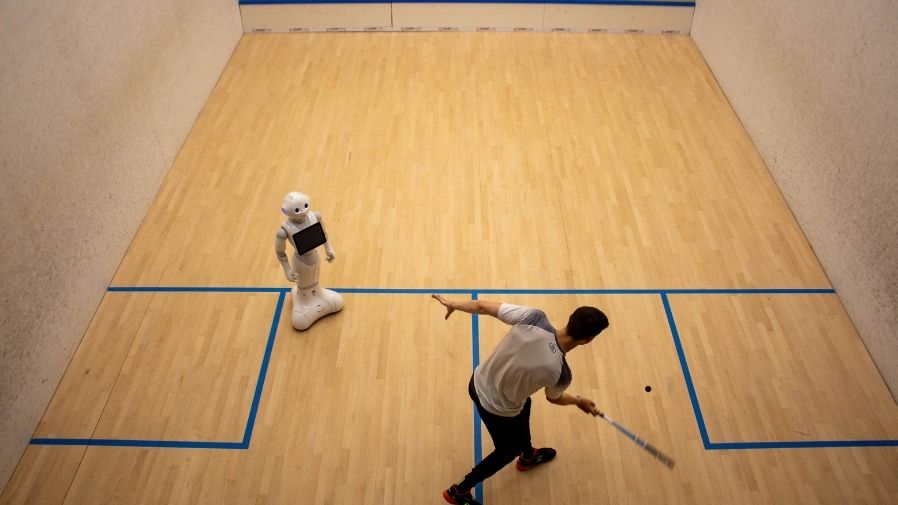Hiring a coach can be an expensive affair, especially if you are looking to ace the sport. This is where robots can change the game, like literally. Pushing the boundaries open and making sports accessible to all, robotics can complement and support the activities of a human coach and bridge the gap between in-person coaching sessions when an individual sportsperson is conducting solo practice. Robots are being used in other sports, and now it is making an entry in the world of squash coaching.
Performance improvements
A social robot from the National Robotarium has become the world’s first squash coach to explore if performance improvements and motivation levels can be increased during a player’s solo practice.
The project will involve research on court between a real player practising a variety of shots and technical aspects of their swing, a motion tracking sensor attached to the squash racket to monitor swings and speeds of hitting the ball, and a robot receiving this data and interpreting what coaching feedback to provide.
Government backing
The project is being led by scientists from the National Robotarium, hosted by Heriot-Watt University. The research facility is part of the Data-Driven Innovation initiative and is supported by £21 million from the UK Government and £1.4 million from the Scottish Government through the £1.3 billion Edinburgh and South East Scotland City Region Deal – a 15-year investment programme jointly funded by both governments and regional partners.
The robotic coaching project will be delivered in collaboration with the industry partner, RacketWare, using its motion-tracking sensor and interfacing technology to translate a player’s data to the robot.
Innovative coaching strategies
Twelve coaching strategies have been developed from observing one-to-one training sessions between real coaches and players. Based on the sensor’s data, the coaching strategy programming will enable the robot to give instructions about what the player should practice next, using hints and tips and positive reinforcement. This will imitate the live coaching experience.
Motivation for solo practice
Martin Ross from Heriot-Watt University said: “We want to discover if robotics can complement and support the activities of a human coach, bridging the gap between in-person coaching sessions when an individual sportsperson is conducting solo practice. Robots have been used in other sports, but we believe this is the world first for squash coaching. We are looking forward to sharing results on whether a robot can improve different aspects of a player’s game and increase their motivation for solo practice. This is particularly relevant during recent lockdown periods as indoor coaching was suspended.”
UK Government Minister for Scotland Iain Stewart said: “Innovations like this mean more and more people are able to access support for their health and wellbeing. The UK Government is investing £290 million in Data-Driven Innovation in Scotland as part of its £1.5 billion City Region and Growth Deals commitment, helping communities to build back better from the pandemic.”
Expensive, no more
Dr Paul Mellor, founding director of Racketware, added: “Solo practice is typically used by professional-level players and committed rank amateurs. Research shows that it increases the skill and motivation levels of all abilities of players. A coaching session is typically £40 per session, with an estimated 10-20 coaching sessions required to progress. It’s expensive, especially if you’re committed to improving your game. That’s why we’re excited about this project. It has the capacity to push the frontiers of how motion sensor technology can be applied to racket sports and explore the area of robotic coaching with motion sensor data to develop products, like ours, that make squash coaching accessible to more people.”
Shaping the future of squash
Supervising the project, Professor Lynne Baillie from the National Robotarium commented: “This project will contribute to our understanding about the value humanoid robots can bring to enhance the sports performance and motivation levels of squash players.”
Paul Bell from Scottish Squash, the national governing body for the sport in Scotland, said: “Historically, squash has been slow to embrace technology. However, there have been some exciting advances in its use in the sport recently, which we have fully embraced at Scottish Squash. This is an exciting new project that has the potential to offer some great insight into how robotics might help improve the performance of squash players in solo practice. We know that solo practice offers great benefits to squash players, so if the use of a robot coach can motivate more players to try it then it will be a great thing for the sport in Scotland.”
The testing started in July this year at Oriam, Scotland’s national performance centre for sport, based at Heriot-Watt University’s Riccarton campus in Edinburgh. The project will be completed in March 2022.
The post This Scottish-government project is making world’s first robot coach to play squash appeared first on UKTN (UK Tech News).



